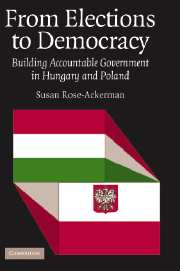Book contents
- Frontmatter
- Contents
- List of Tables
- Preface
- 1 Policy-Making Accountability and Democratic Consolidation
- 2 Alternative Routes to Policy-Making Accountability
- 3 Legacy of the Past
- 4 External Accountability and the European Union
- 5 Oversight
- 6 Decentralized Political Accountability
- 7 Public Participation in Policy Making: Government Procedures
- 8 Civil Society Groups: Overview
- 9 Environmental Advocacy Organizations in Hungary
- 10 Student and Youth Organizations in Poland
- 11 Democratic Consolidation and Policy-Making Accountability
- Appendix 1
- Appendix 2
- References
- Index
2 - Alternative Routes to Policy-Making Accountability
Published online by Cambridge University Press: 23 July 2009
- Frontmatter
- Contents
- List of Tables
- Preface
- 1 Policy-Making Accountability and Democratic Consolidation
- 2 Alternative Routes to Policy-Making Accountability
- 3 Legacy of the Past
- 4 External Accountability and the European Union
- 5 Oversight
- 6 Decentralized Political Accountability
- 7 Public Participation in Policy Making: Government Procedures
- 8 Civil Society Groups: Overview
- 9 Environmental Advocacy Organizations in Hungary
- 10 Student and Youth Organizations in Poland
- 11 Democratic Consolidation and Policy-Making Accountability
- Appendix 1
- Appendix 2
- References
- Index
Summary
An idealized model of parliamentary democracy stands behind many discussions of policy-making accountability in European democracies. In that model, partisan politics is a sufficient route for citizen control of government. Citizens vote for politicians who are members of political parties. The parties are represented in the legislature in proportion to their voter support, and a party coalition forms a government that promulgates policies after consultation with the partisan groups in the legislature. This process of political-will-building expresses the preferences of the society, and an apolitical, professional bureaucracy, which is not influenced by political considerations, administers the resulting statutes. Politics and administration operate in separate spheres. The main constraint on self-seeking behavior by politicians is the threat of a loss at the polls in the next round of elections.
Under this view, it is undemocratic and unfair to permit organized groups or individuals to participate in the administrative process. Participation is unnecessary because bureaucrats operate according to technical, legal, and scientific criteria that provide the “right” answers. The civil service follows clear rules that require little discretion, and officials treat everyone even-handedly. Review is available only to protect individual rights that otherwise might be ignored by bureaucrats focused on general administrative goals.
This model is most clearly expressed in justifications for the postwar German “party-state” and in related claims that procedural guarantees in the administration of programs are unimportant. But, this model is a poor description of German reality, and it is being increasingly challenged.
- Type
- Chapter
- Information
- From Elections to DemocracyBuilding Accountable Government in Hungary and Poland, pp. 14 - 23Publisher: Cambridge University PressPrint publication year: 2005



